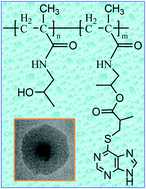Design and fabrication of poly(HPMA)–6-mercaptopurine conjugates and their in vitro anticancer effect
Abstract
In this work, a new kind of polymer system based on poly(N-(2-hydroxypropyl)methacrylamide) (poly(HPMA)) for transporting the anticancer drug 6-mercaptopurine (6MP) was successfully prepared. The vinyl groups were grafted onto the polymer chains via the reaction between poly(HPMA) and methacryloyl chloride (MA), and 6MP was reacted with the vinyl groups in order to be connected to poly(HPMA). Thus, three poly(HPMA) materials containing different contents of 6MP were successfully synthesized. The prepared poly(HPMA)–6MP could be assembled into nanoparticles in aqueous media due to its excellent amphiphilicity. Furthermore, the prepared materials were carefully characterized by TEM, 1H NMR, FTIR, TGA, UV-vis and nanoparticle size analysis. The contents of 6MP in poly(HPMA)–6MP-1–3 were about 5.1%, 9.7% and 13.5%, respectively. These three polymer systems exhibited an enhanced antitumor effect to HL-60 human cells and the value of IC50 of poly(HPMA)–6MP-3 is about 5.9 μg 6MP equivalent mL−1.



 Please wait while we load your content...
Please wait while we load your content...